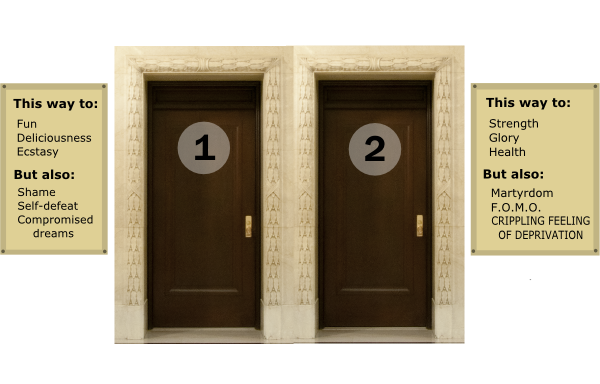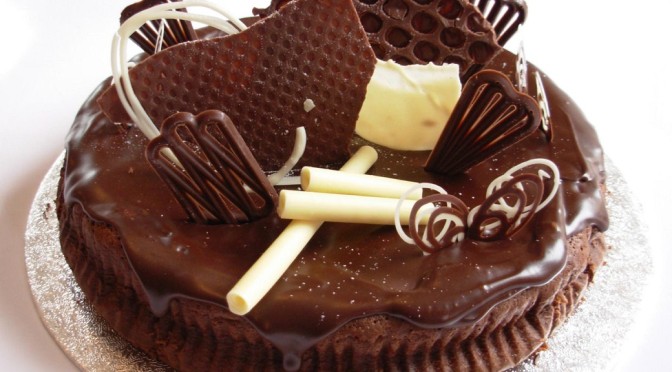by
Here in the so-called First World, we give up a lot because of an exaggerated fear of a particular feeling.
It’s usually pretty subtle, but I see this fear made explicit whenever Mr Money Mustache or other early-retirement advocates get national news coverage. The comment sections of these major publications are always vile, and I don’t recommend you read them, but if you do you will notice a trend. Even when Pete explains the shockingly simple math that proves early retirement is possible for people of average incomes, commenters insist they would prefer to leave their lifestyle costs unchanged than retire twenty years earlier but “live a life of deprivation”.
This unexamined fear of deprivation has a huge effect on our lives. Consumers go into debt because they’re afraid of going without something they’re used to. We eat too much because we’re afraid of being disappointed by small portions. We continue bad habits for years because the thought of disallowing ourselves to do something we enjoy feels oppressive. “We deserve it!” we tell ourselves. Or at least advertisers tell us to tell ourselves that.
The strange thing is that usually it’s not even real deprivation. These are all choices. The big purchase, the extra calories, and the indulgent habit are always available to you to take or leave.
We’re faced with this kind of choice — “Do I let myself have it or not?” — all the time. Particularly when we’re in the midst of some kind of self-improvement effort, we often feel like we’re stuck between a familiar rock and hard place: do the unhealthy thing and feel guilty, or do the healthy thing and feel deprived. You can get the salad instead of the fries, but then you have to watch people eating their fries while you eat your sad little salad.
These kinds of lifestyle choices are about a lot more than simply weighing the respective costs and benefits of excess calories and culinary envy. Going the self-deprivation route feels like we’re renouncing pleasure and comfort as parts of our lives. Such a life of constraint seems awful, so we often choose what looks like freedom. And if freedom is deep-fried, then so be it.
It feels like we’re constantly running into this:

[If you can’t see the image, click here to view this post on Raptitude.]
It’s helpful just to be aware that many of our personal struggles take this form. When you do, often it becomes obvious that Door #1 is nothing more than selling out your future self for a fleeting pleasure whose benefits that are gone in minutes, and whose costs last much longer. In one ill-conceived trip to the cheesecake place, Right Now You gains seventeen minutes of eating pleasure, while Future You loses twelve dollars and gains half a pound of needless fat that will take five extra treadmill visits to lose.
I’m not saying there’s no room for dessert in life. (I don’t know about you, but I will always make room.) But we are never free from the tradeoff. To refuse to deprive yourself of one thing is to deprive yourself of something else. When we indulge in something because we “deserve it” what are we deciding we don’t deserve? A day off where we don’t open our wallets? Not having to atone for our entertainment choice on a treadmill later?
But even when we’re fully aware that Door #2 is better, we still often choose Door #1 because the thought of living in self-deprivation is so abhorrent to us. We fear that Door #2 will lead us inevitably to becoming a monk- or nun-like figure who eats three grains of rice for dinner, sleeps on a wooden board and remembers that life was once joyful.
The path of self-deprivation feels like giving up on happiness. We get painful mental images of being left out of everything, like beer, concerts, fried foods, nice clothes, nights out, and the freedom to do what you like will always be on the other side of the glass — unless you take Door #1.
This is nonsense. There’s more happiness to be found in doing the wiser thing most of the time, and we know it. Our freedom to go either way is always there, and the agony of self-deprivation is just a monster under the bed. It’s only there until you look.
There’s no such thing as “having it all”
My fasting experiment is confirming an old suspicion of mine: that the pain of self-deprivation (which is probably more fairly called “voluntarily going without”) is just a scarecrow. Living in fear of it is much more constraining than what you find when you pass through it.
Door #2 isn’t the end of freedom, it’s the beginning. There are some initial uncomfortable feelings, some passing urges to throw it all away and indulge, but the background to these sporadic pangs is a steady sense of empowerment, a new confidence in your ability to do what’s best for yourself.
The change in my mentality towards food in the last few weeks has been remarkable, and ironic: because refraining from eating is something I do at some point every day, I experience a greater freedom to indulge. I can have a big fancy meal knowing that I will simply eat less for the rest of the day. Or I can refrain from that meal knowing that it will earn me the same freedom later. In neither case is there any shame or conflicted feelings, or new belly fat. The feeling of wanting but not having no longer scares me, because I’ve let myself experience it. It’s not that bad — much better than feelings like guilt and self-disappointment — and it passes.
And of course, it isn’t deprivation, because the choice remains mine. True deprivation is when you don’t have access to something you need. Our exaggerated fear of feeling deprived is a sign of how unhealthy our relationship to our wants has become in consumer societies. We don’t just fear not having enough of something, we fear not having all we want of that thing.
Two weeks into my fasting regimen, I listened to a podcast with Joseph Goldstein, a prominent meditation teacher and author, and he made point that was timely for me. He said that the monastic idea of renunciation tends to seem burdensome to us. It implies feelings of deprivation and loss. But he learned to view renunciation instead as non-addiction to our desires, which turned it on its head — rather than the adoption of a new burden, it’s the shedding of an old one.
Goldstein said one of his students asked a visiting Buddhist master, “Why become a master?” He thought about it and said, “Because it’s easier.”
We know both doors have consequences, but we greatly overestimate the downsides of Door #2 (and the upsides of Door #1). This almost certainly has much to do with our First-World ideas of success. Happiness is generally conceived of as “having it all,” and it’s quite a foreign idea to argue that it’s objectively better not to have it all. We are terrified to be have-nots, not because we love our indulgences so much but because we don’t want to feel like poor people. We don’t want to even flirt with the feeling of deprivation, even if our going without is voluntary (and probably temporary), and even when we know it is the better choice.
Adventures in Going Without
Taking my word for it isn’t going to change anything though, because the fear of deprivation is caused by a false understanding of what it’s actually like to live behind door #2 in a particular area; taking a little peek isn’t enough to know. If you’re averse to becoming an early riser, but can see the benefits of it, you aren’t going to know what it’s like to be one that first groggy morning. You will still be in the throes of resistance, still a late-riser forcing yourself through the motions, still unaware of what you stand to gain, with a large part of your heart still set on slipping out through the other door and going back to bed.
The real revelation comes later, when you’re past that initial obsession with what you’re passing up, and you can finally appreciate what you’ve been freed from. Days that end too soon. Procrastination loops. Mid-afternoon bouts of shame and guilt. Late-night, panicked study sessions. A lack of self-confidence you never knew you had. Who knows.
These explorations don’t have to be life-long renunciations either. The idea is just to experiment with taking the other way when you find yourself at that familiar rock and hard place, and staying with it for long enough that you get a sense of what is gained, rather than lost.
Our exaggerated fear of feeling deprived is costing us a lot: years of our lives, our autonomy, our health, and our planet. All we need to do to reclaim those things is to make a game out of seeing what’s behind Door #2 a little more often.
